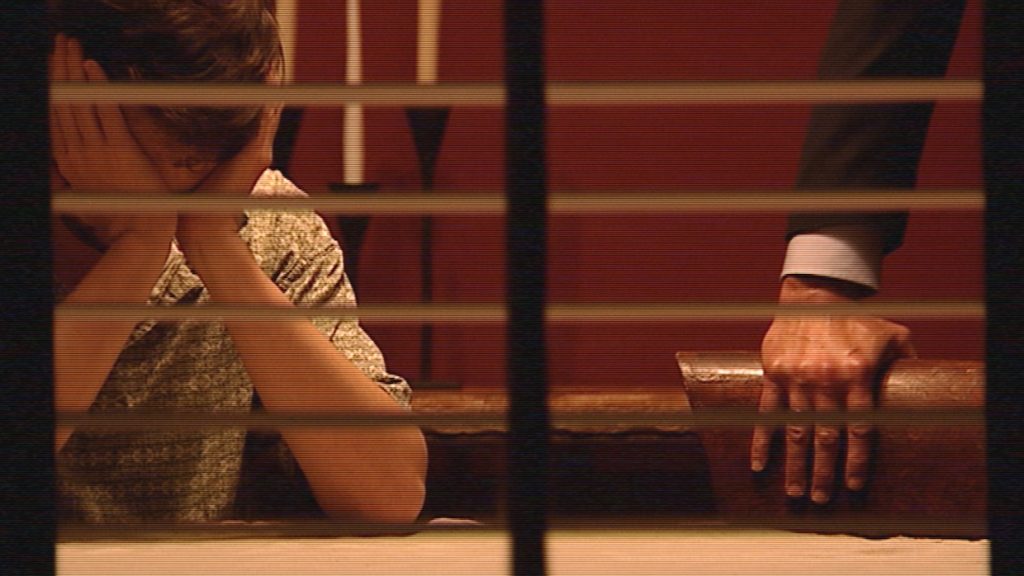This documentary about the success of To Catch a Predator hits on something primal. The opening moments of Predators feature a skin-crawling recording of phone conversation between a grown man saying sexual things while a girlish voice giggles. In its first seconds, the film evokes disgust and anger, and it’s difficult not to recoil from the screen with an audible “ugh.” Yet director David Osit (Mayor) doesn’t just want to provoke these very basic (and very justified) feelings; instead, his movie asks deeply complex questions, requiring the audience to go beyond their immediate gut reaction to what they’ve heard and think through the larger philosophical and ethical questions behind a hit reality show and the entertainment it provided for the masses.
And that’s what To Catch a Predator was: entertainment. For the blissfully uninitiated, the 2004–2007 show followed a team doing what law enforcement theoretically couldn’t: they went into internet chatrooms, posing as children and trying to get adult men to meet up with them in real life. When they agreed, the series would set up a camera crew at a house, where adult decoys posed as the kids the men thought they had been talking to. Once the men made their intentions clear, host Chris Hansen would show up, revealing that they were on camera and eliciting feelings of satisfaction from an audience entranced by this new danger for a generation of children.
It was all couched in the world of journalism as a recurring segment on the NBC News show Dateline, but Predators convincingly argues that it was ultimately more concerned with drawing TV audiences into its sordid stories and getting ratings than with helping to bring child molesters to justice. Predators presents the narrative of the show, the men it caught, and the cast and crew who made it, as well as sharing its societal impact, which lingers more than a decade later.
Osit goes beyond what aired Friday nights on NBC, showing the raw footage and multiple angles of the stings as well as interviews with people who were there. It’s an astonishing document filled with unedited digital video that Osit obtained from fans’ FOIA requests and other sources, and it’s just as jaw-dropping as what was televised, if not more so. Predators comments not only on this specific show and its moment, but also on the power of editing in reality and crime shows in general – and how the audience is manipulated to feel the intended emotions, rather than see the alleged criminals as humans.

To be clear, Predators isn’t dodging the horrors of the sexual abuse of children and teens. It emphasizes the impact that this kind of assault has on survivors for the rest of their lives. Yet it also considers the ethics of what Hansen and the To Catch a Predator team did and what copycat content does today. Are they actually doing good and keeping kids from harm, or are they supplanting the judicial and journalistic systems without concerns for the law and morals?
Predators begins by focusing on the original series, showing the complicated world behind the scenes, including recent interviews with the decoys. It then shifts to the imitators that have echoed in the YouTube era, which exacerbates the issues of the original. To Catch a Predator might have operated in murky waters at best, but the internet vigilantes that followed in its footsteps have neither the journalistic standards nor legal expertise of NBC News behind them, making it even more worrisome. The most telling shot in the whole film might be the beaded bracelet with the word “BATMAN” worn by one of the copycats. Yet while there is ostensibly the desire to bring these alleged criminals to justice and be a superhero, it’s outweighed by a need for likes and subscribes.
Osit serves as the film’s director, producer, editor, and cinematographer, and his personal investment is evident. He approaches the material with thoughtfulness and without the need to land on an answer as cut-and-dried as To Catch a Predator. Yet as much as it’s an intellectual and philosophical documentary, Predators is also a chilling experience. It’s impossible to watch without considering the complicity of not only the show but also the audience that makes it—and similar true crime series, films, and podcasts—a huge success. This is a masterful use of the medium that reflects on both its central subject but also on the world as a whole, and what it shows is profoundly disturbing.
A-
“Predators” is in theaters Friday.



